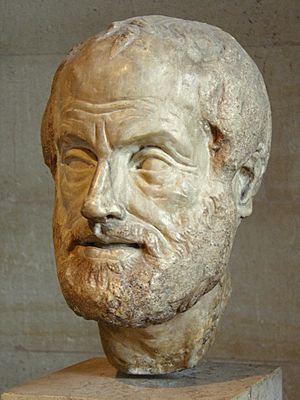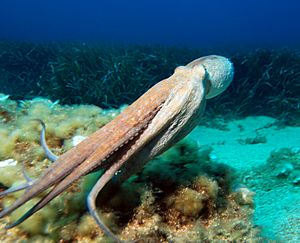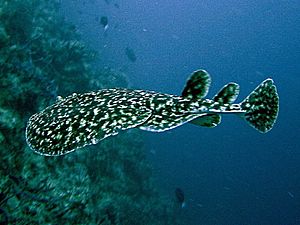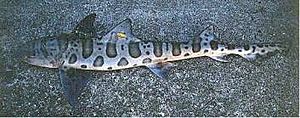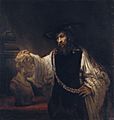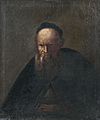Aristotle facts for kids
Aristotle (born in Stagira, Macedonia, 384 BC – died in Chalcis, Euboea, Greece, 7 March 322 BC) was a very important Greek philosopher. He is known as one of the most influential thinkers in the history of Western civilization. Aristotle wrote many books, but only a few of them have survived until today. He was also the teacher of Alexander the Great when Alexander was a boy. Later, Alexander sent him plants and animals from his new empire to help with his studies.
Contents
Life of Aristotle
Aristotle's father, Nicomachus, was a doctor for King Amyntas of Macedonia. When Aristotle was about 18 years old, he moved to Athens to study at Plato's Academy. He stayed there for almost 20 years, learning from Plato.
After Plato died in 347 BC, Aristotle traveled to Asia Minor. He also visited the island of Lesbos with his friend Theophrastus. There, they studied plants and animals. Later, in 343 BC, King Philip II of Macedon invited Aristotle to be the tutor for his son, Alexander the Great.
Aristotle became the head of the royal academy in Macedon. He taught not only Alexander but also two other future kings, Ptolemy and Cassander. Aristotle encouraged Alexander to conquer lands to the east.
Around 335 BC, Aristotle returned to Athens and started his own school called the Lyceum. He taught there for 12 years. Many of his important works are believed to have been written during this time. These works are thought to be his lecture notes for his students.
Aristotle's writings cover many different subjects. Some people believe he was the last person to know almost everything that was known in his time.
Towards the end of Alexander's life, there were some disagreements between them. Aristotle did not like Alexander's claim to be a god. After Alexander died in 323 BC, people in Athens became angry at Macedonians. Aristotle left Athens, but he died in Euboea that same year, 322 BC, from natural causes.
Aristotle's Philosophy
The three most famous ancient Greek philosophers were Socrates, Plato, and Aristotle. Socrates taught Plato, and then Plato taught Aristotle. These three thinkers helped shape Western philosophy as we know it. Aristotle, in turn, taught Alexander the Great, who later conquered a large part of the Middle East.
Plato believed that true knowledge came from the soul and not from our senses. He thought that the world we see is just a copy of perfect "Forms" or ideas.
Aristotle had different ideas. He believed that knowledge from our senses was very important. These ideas later became some of the basic principles of the scientific method. Many of the writings we have from Aristotle today are notes from his lectures. Some of his famous works include Physics, Metaphysics, (Nicomachean) Ethics, Politics, De Anima (On the Soul), and Poetics.
Aristotle also disagreed with the atomic theory of Democritus. Democritus believed that everything was made of tiny, unbreakable particles called "atoms." Aristotle, however, thought that matter was continuous. Later, in 1804, physicist John Dalton proved Democritus's idea about atoms was correct.
Logic
Aristotle developed a system of logic. His logic is called sentential logic because it uses sentences to form syllogisms, which are ways of reasoning.
Aristotle's logic had a huge impact on Western thought. It was used and copied in Arabic and Latin writings during the medieval period. His logic was dominant for about 2,500 years. Then, in the late 1800s, new forms of logic were developed by thinkers like Gottlob Frege and Charles Sanders Peirce.
Aristotle's Biology Studies
Aristotle is one of the earliest natural historians whose detailed work still exists. He studied the natural history of Lesbos and the surrounding seas. His books like History of Animals, Generation of Animals, and Parts of Animals contain many observations and ideas. They also include some myths and mistakes.
His most amazing descriptions are about sea creatures around Lesbos. He observed live animals and also got specimens from fishermen. His notes on catfish, electric fish (like the Torpedo), and angler-fish are very detailed. His descriptions of cephalopods like the Octopus, Sepia (cuttlefish), and the paper nautilus (Argonauta argo) are very accurate. He even described the hectocotyl arm, which is used in reproduction. People didn't believe this until it was rediscovered in the 19th century. He also knew that aquatic mammals were different from fish. He correctly grouped sharks and rays together.
Another example of his careful study is from Generation of Animals. Aristotle described opening fertilized chicken eggs at different times to see how the organs developed.
He also accurately described the four-chambered stomachs of ruminants (like cows). He also noted the ovoviviparous egg development of the houndshark Mustelus mustelus, where eggs hatch inside the mother.
Aristotle's Works
Aristotle's works are usually listed in this order:
- Logic
- Categories (about terms)
- On Interpretation (about statements and truth)
- Prior Analytics (about syllogistic logic)
- Posterior Analytics (about the scientific method)
- Topics (rules for arguments)
- On Sophistical Refutations (about mistakes in reasoning)
- Science and Nature
- Physics (about change, motion, empty space, time)
- On the Heavens (about the sky, earth, and elements)
- On Generation and Corruption
- Meteorology (about comets, weather, and disasters)
- The Parva Naturalia (psychological works)
- Sense and Sensibilia (about senses, mind, imagination)
- On Memory
- Sleep, Dreams, and Prophesy
- Length of Life
- Works on Natural History
- History of Animals
- On the Parts of Animals
- On the Movement of Animals
- On the Progression of Animals
- On the Generation of Animals
- Problems
- Philosophical Works
- Metaphysics (about reality, causes, forms)
- Nicomachean Ethics (about happiness, goodness, friendship)
- Eudemian Ethics (about good and bad qualities)
- Politics (about the best types of governments)
- Rhetoric (about public speaking and debate)
- Poetics (about tragedy and epic poetry)
- The Constitution of the Athenians
- Fragments (small parts of lost works)
How Aristotle's Work Influenced Others
Aristotle is still one of the most influential people who ever lived. He contributed to almost every type of knowledge in his time. He also started many new fields of study. It is said that "It is doubtful whether any human being has ever known as much as he did."
Aristotle founded formal logic. He was a pioneer in the study of zoology (animals). He also helped develop the scientific method.
Even with all his achievements, some people, like Peter Medawar, believe that some of Aristotle's mistakes slowed down scientific progress. Bertrand Russell noted that "almost every serious intellectual advance has had to begin with an attack on some Aristotelian doctrine." However, Russell also recognized how much Aristotle advanced knowledge compared to the thinkers before him.
Aristotle's immediate influence was seen as his school, the Lyceum, grew into the Peripatetic school of philosophers. His influence on Alexander the Great is clear because Alexander brought biologists and researchers with him on his expeditions.
See Also
 In Spanish: Aristóteles para niños
In Spanish: Aristóteles para niños
Images for kids
-
School of Aristotle in Mieza, Macedonia, Greece
-
Plato (left) and Aristotle in Raphael's 1509 painting, The School of Athens. Aristotle holds his Nicomachean Ethics and points to the earth, showing his belief in studying the real world. Plato points to the heavens, showing his idea of perfect Forms.
-
Aristotle noticed that the ground level of the Aeolian islands changed before a volcanic eruption.
-
Among many new observations about animals, Aristotle described the reproductive hectocotyl arm of the octopus (bottom left).
-
Aristotle suggested a three-part structure for souls of plants, animals, and humans. He believed humans were unique because they had all three types of soul.
-
The Blind Oedipus Commending his Children to the Gods (1784) by Bénigne Gagneraux. In his Poetics, Aristotle used the play Oedipus Tyrannus by Sophocles as an example of a perfect tragedy.
-
Frontispiece to a 1644 version of Theophrastus's Historia Plantarum, originally written around 300 BC.
-
William Harvey's De Motu Cordis, 1628, showed that blood circulated in the body, which was different from older ideas.
-
Aristotle by Justus van Gent. Oil on panel, around 1476.
-
Phyllis and Aristotle by Lucas Cranach the Elder. Oil on panel, 1530.
-
Aristotle by Paolo Veronese, Biblioteka Marciana. Oil on canvas, 1560s.
-
Aristotle by Jusepe de Ribera. Oil on canvas, 1637.
-
Aristotle by Francesco Hayez. Oil on canvas, 1811.
-
Relief of Aristotle and Plato by Luca della Robbia, Florence Cathedral, 1437–1439.
-
Stone statue in a niche, Gladstone's Library, Hawarden, Wales, 1899.


